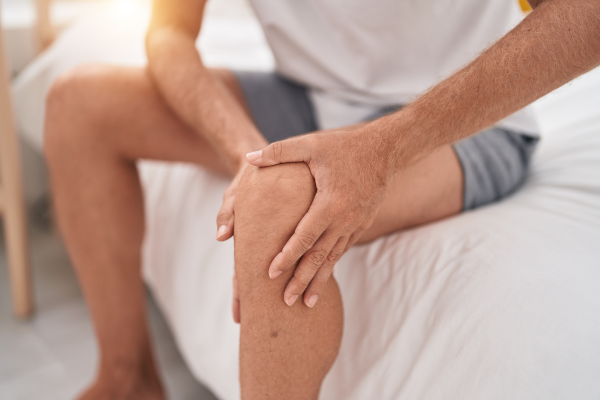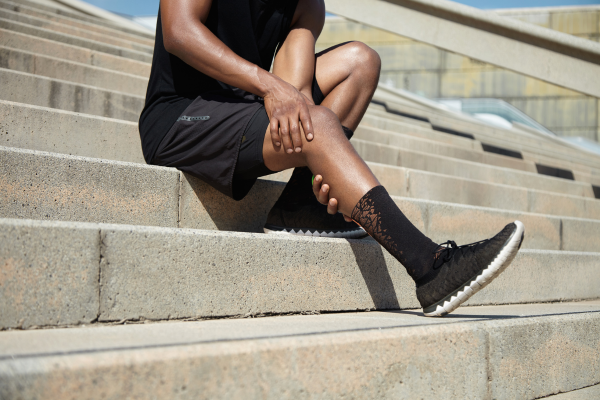Are you experiencing stress, tension, muscle tenderness, or even chronic pain? Deep tissue massage therapy may be the solution for you. Deep tissue massages are best for people who are suffering from an injury or chronic pain.
In this article we’ll explore what a deep tissue massage is, the benefits, plus any side effects that you may feel.
What is a deep tissue massage?
Designed to treat musculoskeletal issues like strains and injuries sustained through sports, a deep tissue massage is a technique that involves applying sustained pressure to the connective tissues and inner layers of the muscle using slow, deep strokes. Applying pressure helps to break up any scar tissue that has formed as a result of injury, as well as helping to reduce tension and tightness in the muscles and tissue.
Deep tissue massage is typically used to resolve discomfort in the back, neck, shoulders, thighs and legs. There are, however, instances that deep tissue massage would be used on the feet, to resolve issues like plantar fasciitis or on the arms, to fix a case of tennis elbow for example. They can also be an effective reliever of stress, as the massage can help relieve any tension carried in the body.
You will find that a deep tissue massage typically lasts between 30-60 minutes, and although it is an intense, deep massage, you shouldn’t feel any pain during the treatment. If you are, you should speak to your massage therapist.
Benefits of a deep tissue massage
There are many benefits associated with a deep tissue massage, including both physical and psychological benefits. The key focus of many other types of massage is to offer relaxation, but due to the intense nature of a deep tissue massage, you’ll get the added benefits of treating muscle pain and stiffness or tension in the muscles themselves.
During a 2014 study, it was even discovered that deep tissue massage can help reduce pain in people struggling with chronic lower back pain, with its effects being likened to taking anti-inflammatory medicines like ibuprofen.
Deep tissue massage has also been reported to help relieve pain associated with:
- Sports injuries
- Sciatica
- Plantar fasciitis
- High-blood pressure
- Fibromyalgia
- Tennis elbow
Let’s explore the other benefits of a deep tissue massage:
Pain relief
If you’re suffering from a chronic condition (like sciatica), have developed a sports injury, or are struggling with other muscle or tissue related aches, stiffness or pains, deep tissue massage can be an effective pain reliever.
Lowers blood pressure
Deep tissue massage can even be effective at lowering blood pressure! This is due to the pressure applied during the massage having a positive effect on systolic, diastolic, and mean arterial blood pressure.
Helps sleep
Deep tissue massages are a great way to combat feelings of insomnia, due to the massage increasing the body’s production of serotonin; it’s thought that the area of the brain that helps the body fall into REM sleep uses serotonin to communicate. Additionally, if you’ve been kept awake due to pain, a deep tissue massage can help relieve this pain, helping you sleep better.
Improves healing and reduces stress
When you’re feeling stressed, your body produces an excess of a stress hormone called Cortisol from the adrenal glands that sit on top of your kidneys.
During a deep tissue massage your blood flow is stimulated, which then causes the body to begin releasing endorphins that relax the blood vessels. This in turn, reduces the intensity of the heart pumping, as well as shutting down the adrenals from producing excess cortisol. Your blood flow will increase, and carry nutrient-rich blood cells and oxygen through the body, which aids in healing.
Breaks up scar tissue
When it comes to breaking up scar tissue, a deep tissue massage helps to break down adhesions and collagen fibres that have been caused as a result of scar tissue. An adhesion is a band of scar tissue that connects two parts/surfaces of the body that would usually be separate.
Adhesions can cause pain, discomfort, restrictions to movement and an increase in stress, so breaking down the adhesions and scar tissue through deep tissue massage can relieve these pains and restrictions and reduce stress.
Release tight muscles
Deep tissue massages are effective at reducing muscle tightness by stimulating blood circulation, breaking down adhesions and increasing the temperature of soft tissue. The pressure from the massage can also help facilitate the movement of toxins from your muscles.
Side effects of deep tissue massage
Due to the intensity of a deep tissue massage, it’s not uncommon to have some remaining tenderness from your session for the following few days. You can use a cool pack or heating pad to help relieve lingering feelings from the massage.
Many patients reported feeling sleepy or thirsty after a deep tissue massage, and you may even experience headaches or feelings of nausea (although this is unlikely) due to the toxins that have been released, which are now moving through your body. Staying well-rested and hydrated following a session can help alleviate these symptoms.
Can I get a deep tissue massage?
Though massage therapy is considered very safe, deep tissue massage utilises extremely firm pressure and therefore may not be suitable for everyone. You should speak with your doctor before seeking a deep tissue massage if any of the below applies to you:
- If you’re taking blood thinners
- If you have a bleeding disorder
- If you have cancer or are undergoing treatment for cancer like chemotherapy or radiation
- If you have a history of blood clots or a clotting disorder
Additionally, deep tissue massage isn’t suitable for anyone who is pregnant, or those with osteoporosis or bone cancer due to the intense nature of the massage. If you have an open wound or any type of skin infection, you may also want to avoid deep tissue massage until the wound has healed or the infection has improved as this could make it worse.
Deep tissue massage at Carl Todd Clinics
Unsure if a deep tissue massage is right for you? Why not get in touch with one of our experts to get some more advice on how deep tissue massage can help you; call one of clinics or get in touch with us on contact@carltoddclinics.com





